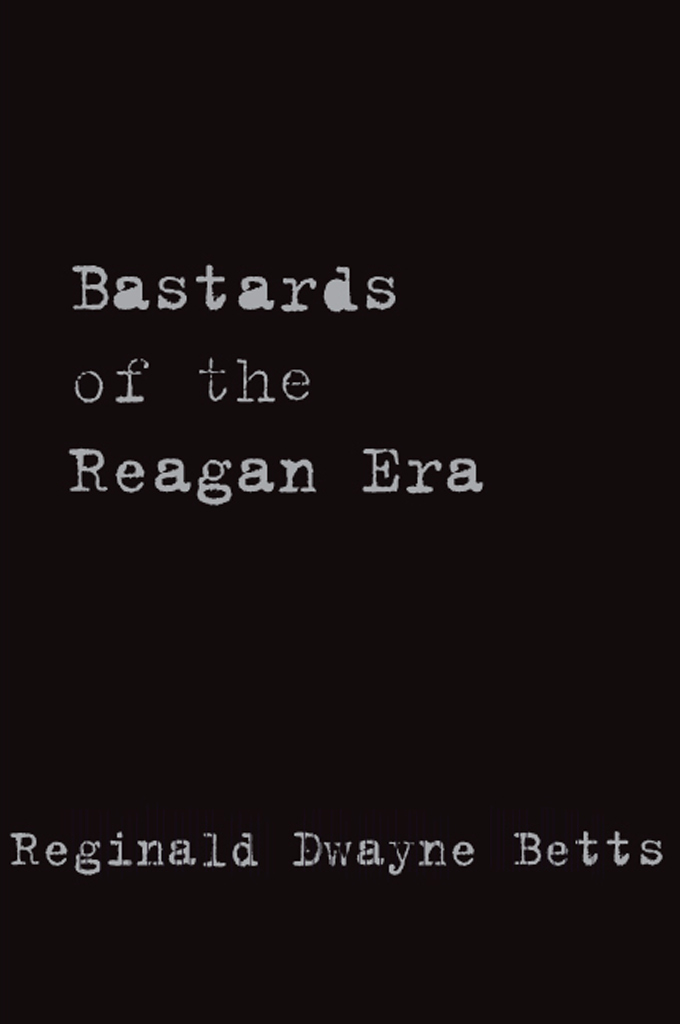Bastards of the Reagan Era
Reginald Dwayne Betts rose from criminal obscurity to a current man of letters with an award-winning memoir and debut poetry collection, a Pushcart Prize, and now his second book of poetry, Bastards of the Reagan Era. The title conjures the time period of much of the work—Betts’s childhood in the 1980s—when he participated in a carjacking that put him in prison for the better part of a decade. Charged as an adult, sixteen year-old Betts spent ten days in solitary confinement while waiting for trial, where he discovered poetry after coming across an anthology of black poets being passed around. Soon after, he began writing heavily, and this dedication appears in his vivid imagery that often bites at the core of longstanding societal issues for urban youth. Reginald Dwayne Betts rose from criminal obscurity to a current man of letters with an award-winning memoir and debut poetry collection, a Pushcart Prize, and now his second book of poetry, Bastards of the Reagan Era. The title conjures the time period of much of the work—Betts’s childhood in the 1980s—when he participated in a carjacking that put him in prison for the better part of a decade. Charged as an adult, sixteen year-old Betts spent ten days in solitary confinement while waiting for trial, where he discovered poetry after coming across an anthology of black poets being passed around. Soon after, he began writing heavily, and this dedication appears in his vivid imagery that often bites at the core of longstanding societal issues for urban youth.
The selections begin on an emotional note, with a poem, “Elephants in the Fall,” in two parts – one for each of his young sons, giving the reader a glimpse of contemporary security from a loving father. The poem stands as a serene prelude of reflection in contrast to the gritty poetry about his own youth and imprisonment that awaits later in the text.
The poems present a nearly equal mix of a rhythmic, almost staccato style and flowing, freeform narrative. Betts’s wordplay is in fine form in “Elegy with a City in It,” the compelling intensity of the language highlighting the ever-present steel in a city and prison cell. Some major themes are also introduced here, such as poverty, urban violence, and the crack epidemic. These rough streets have been trod by a series of urban writers throughout the modern era; the material contains a barrage of violent and heartbreaking images, though without a collapse into cliché or trope, and at least acknowledging that “There is this sadness / in the world when all the stereotypes seem true.” Indeed, modern poems such as these would feel right at home alongside those written by leading black poets of the ‘60s who struggled through similar circumstances. But Betts’s period work is also pure ‘80s, with that decade’s references peppering the language under the umbrella of Reagan’s punishing surge of the War on Drugs. Moving from rough ghetto to rough prison cell, the poems offer little relief for the characters in them, or for the reader.
Betts’s description of his dysfunctional past comes without a tinge of irony or nostalgia; he is more interested in revisiting and reporting than buttressing his words with literary sugar pills to help the poems go down easier. It was a hard start to life that few are able to escape, which makes his subsequent success that much more triumphant. Escaping the all-too typical cycle of life for generations of black youth (birth, prison, death) allows for harsh commentary of how America deals with struggling minorities:
& the bodies that roll off the block
& into the prisons and into the ground,
keep rolling, & no one will admit
that this is the way America strangles itself.– “For the City that Nearly Broke Me”
“Bastards of the Reagan Era” is a poem in nine parts, each section borrowing titles from Public Enemy’s 1988 groundbreaking rap album, It Takes a Nation of Millions to Hold Us Back. Betts tells his fragmented stories with honesty and conviction, chalking up his start to an environment “[ . . . ] in a cloud of rhetoric / And ganja smoke,” and being “lost in sounds: / The agitprop of Public Enemy; / The gunshots, sound of cocaine cooking [ . . . ].”
There are no less than eleven poems with the title For the City That Nearly Broke Me, all aggressive episodes about street violence and death, and the series contains some of his best evocative lines, painting the world in the gray, black, and red of a violent landscape filled with drugs and guns:
[ . . . ] names robbed
of flesh by callow boys (all peach
fuzz & pistols ruined by
a rack of streets that bleed white chalk.
“The Invention of Crack” is a stunning commentary on the Reagan-era War on Drugs and its effect on his community. The poem reads as a narrative bordering on a monologue, or even a conversation with God: “Jesus, some of us still be praying with aluminum between / our lips. All our music reduced to something clever to say about dope.” His prayers and pleas to authority continue throughout the poem, asking the Lord to grant “Whatever will that will bury what brought smoke, crystalline / white rocks to our streets” before putting his finger directly on the lure of the drug epidemic, without using it for an excuse:
It feels like God has dropped
A piece of heaven behind
Your eyelids. After that, all
You want is to be that close
To an angel again.
The collection ends with the Pushcart Prize-winning “What We Know of Horses,” introducing an interesting metaphor usually found within more pastoral poems. Betts broadens the rhetoric for the heroin that coursed through the veins of men, like his uncle and a cousin “shivering / with the memory of that stallion / gone postal in their veins,” and a visit to his incarcerated brother, likening prison to a horse collar that “cuts into skin, / how the leather embraces / all of our necks.”
Taken as a whole, Bastards of the Reagan Era is an unrelenting visit into disturbing trends in American subcultures, from the concrete of the street to the steel bars of a prison cell. There is little mincing of words here but the content does not lend for such treatment and those who seek a more sobering look at society should find plenty of images to choose from. One can only wish Betts well as he progresses into a more positive, productive future as a family man, accomplished writer, and future lawyer.





